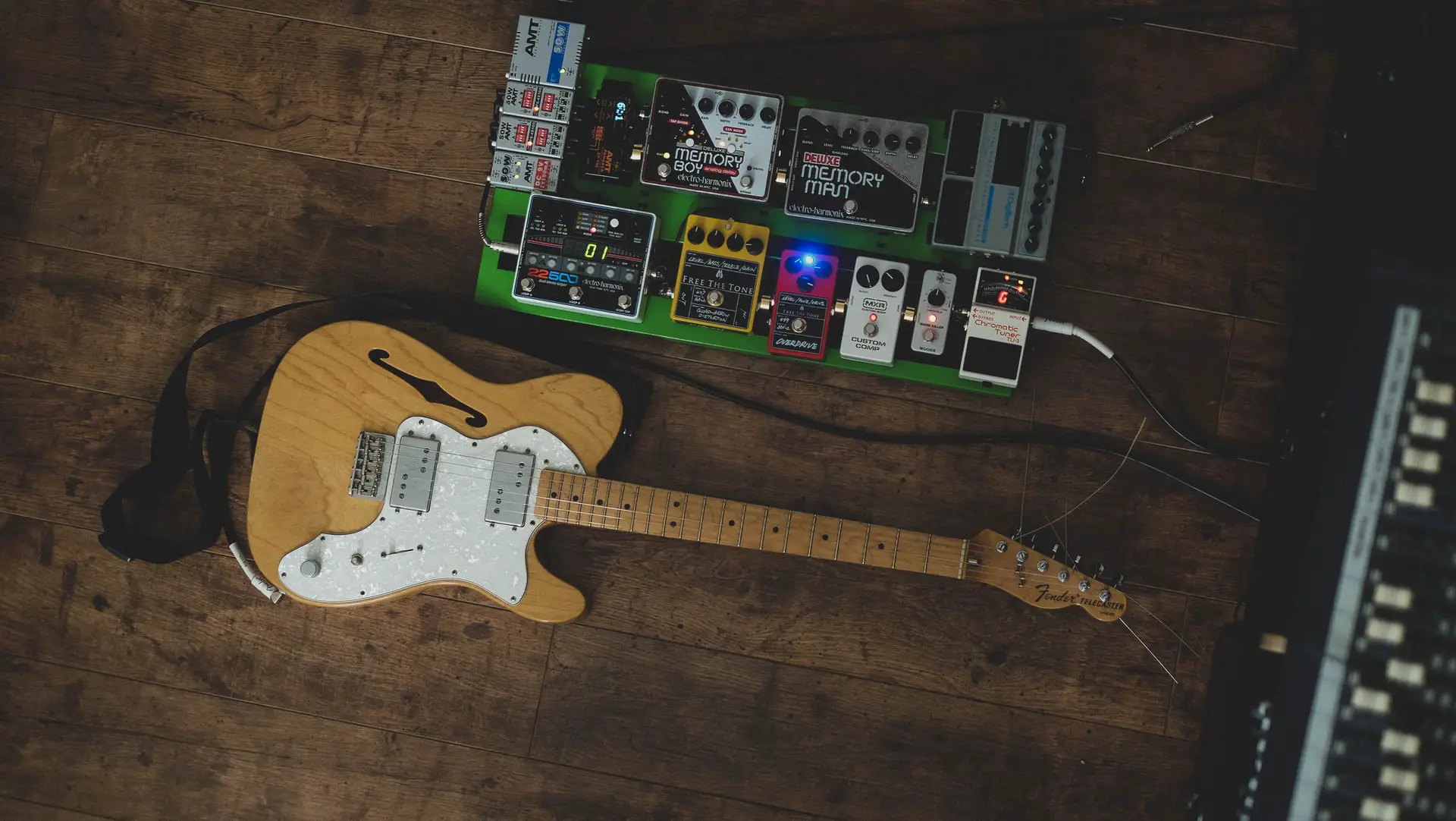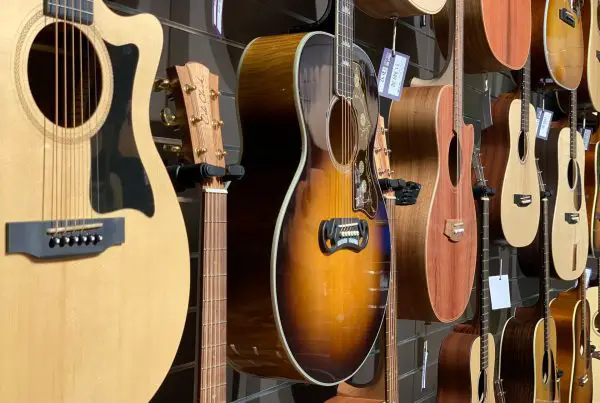Guitar cables have an effect on the tone of the guitar. The better shielded and conductor quality cables tend to produce better sound than the other ones. The shorter, well-shielded and well-protected cables tend to be the most durable and good-sounding guitar cables out there.
To understand the quality of a guitar cable, you should have some knowledge about what materials are used in the cable. The cable is made of different types of materials which we would discuss shortly.
I personally have used dozens of different types of guitar cables and they have sounded a little bit different, but that doesn’t mean the expensive cables were the best ones. Most of the guitarists actually prefer the cables with the most durable material than the more fancy or long cables because no one wants to embarrass themselves in front of people.
Here’s the upcoming content in this article:
- Do guitar cables make a difference in tone?
- Does cable length affect guitar tone?
- Do long cables suck tone?
- Are thicker guitar cables better?
- Are good guitar cables worth it?
- Do expensive Guitar cables make any difference?
- Do gold-plated guitar cables make a difference?
- How much should I spend on a guitar cable?
- What size is best for a guitar cable
- What to see when getting a good guitar cable?
Do guitar cables make a difference in tone?
Guitar cables have an effect on the tone and sound of the guitar. Some cables which have bad material used in them have a tendency to produce noise which is not the best thing.
Other than that, some cables perform better in high frequencies and some in low frequencies.
The cables are made of five major components which are:
- The center conductor
- Insulator
- Electrostatic shield
- Braided Copper shield
- Outer jacket
Most of the components are often the same in cables except the electrostatic shield. Some cable companies don’t put an electrostatic shield or put a bad quality electrostatic shield.
These factors lead to produce crackling sound. Furthermore, the conductor material also affects the sound. Usually, the oxygen-free copper or linear-crystal copper conductors are the best kinds and they produce the quality sound for the listeners.
Does cable length affect guitar tone?
The length of a cable does affect the quality of tone negatively. The longer cables can cause pick-up noise which would lead to a low-quality sound.
Interestingly, the longer cables are even more expensive than the shorter ones which sounds even better. There is more than one reason why guitarists have a dislike and these are:
- Long cables pick up noise.
- The signal-to-noise ratio is even lower in longer cables.
- The signal gets weaker.
- They can get damaged quicker than the shorter ones.
Looking at all of these struggles, I would always suggest a short cable of probably not more than 18 ft to avoid noise and for clean sound. This way, your cable would also not get damaged that quickly.
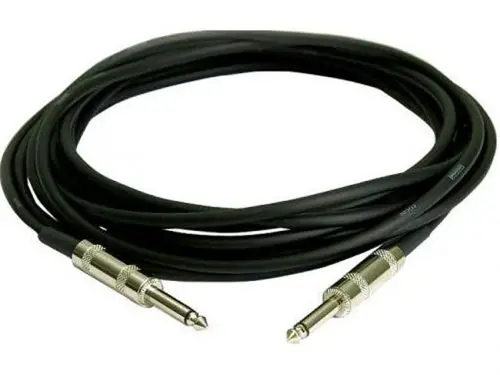
Do long cables suck tone?
Long cables do suck tone and lose sound. The sound gets noisier and noisier as the distance between guitar and amp increases.
It is common knowledge that longer cables tend to lose their signals over the distance. This is the reason why companies don’t make cables longer than 25 ft.
Signals get so weak by the time it reaches the amplifier that it results in heavy noise. To avoid these circumstances and to get the finest quality sound, you should use a short cable.
Are thicker guitar cables better?
Thick cables have no effect on the sound or tone of the guitar. Thick cables usually have a thick outer jacket which doesn’t affect the sound quality.
The outer jacket of a cable is just there to protect the cable from any damage or interference and most cables are thick enough to not cause any problem to guitarists. Thick cables can be useful if you want a cable that would last many years because the outer jacket would be impenetrable.
There are many cables in the market which come with an extra protective layer outside the cable which isn’t going to sound any better, but they will surely last much longer than the regular ones.
If you have to work in rough conditions, then you should consider buying a thick cable, otherwise, you are good with a normal cable.
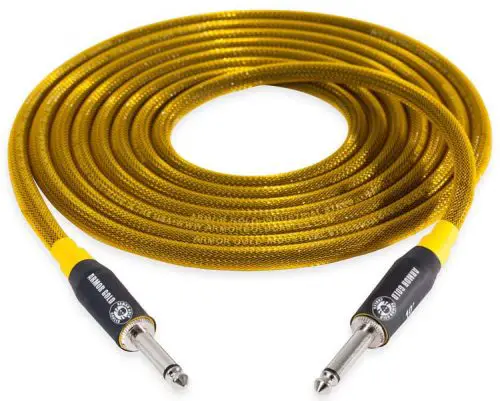
Thickness of guitar cable doesn’t matter. Most of the time, thickness of cable comes from the thick outer jacket – which won’t impact tone.
Are good guitar cables worth it?
Good guitar cables are definitely worth it. However, many don’t know what makes a guitar cable good. It is certainly not the price of the cable but the quality of material used in the cable.
A cable with good insulation, shielding, and conductor would definitely sound better than the ones with inferior quality. There are many cables in the market which are advertised to be the best ones, but in reality, they even miss some good components of a cable.
These are some factors that affect the quality of a guitar cable:
- Length
- Conductor material
- Shielding
- Electrostatic shielding
- Conductor design
- Connector quality
- Insulation material
Do expensive Guitar cables make any difference?
Expensive guitar cables certainly don’t make any difference. There are some good guitar cables which are even cheaper and better than the expensive ones.
People have a misconception that the expensive cables would be the best ones, but that’s not true. Certainly, some expensive cables do sound better, but it is not always the case. Many companies charge extra in the name of better sound, but in reality, they are just the same.
These are some advertising ploys many companies use:
- Cable length. Many long cables are more expensive than the shorter ones, but they are even worse for the sound quality and cable quality. As discussed above, long cables tend to pick up noise and get damaged quicker.
- Thick Outer jacket. Many companies charge extra for the outer jacket being thicker than the other and claim their cables to be better sounding. However, in reality, the outer jacket doesn’t matter much for the quality of sound. They are just good for protecting the cable and they surely last longer.
- Gold-plated Connectors. Another marketing ploy is the “gold-plated” connector instead of the normal nickel or silver ones. In reality, gold-plated connectors are just better in performing against corrosion. They last longer than the nickel or silver ones, but this has nothing to do with the sound quality of a cable.
Do gold-plated connectors make a difference?
Gold-plated connectors do not make any difference to the tone whatsoever. Connectors made of Nickel or Silver produce just as same sound as the gold-plated ones.
There is a big marketing hoax about gold-plated connectors is one of the best, but in reality, sound quality is not based on gold-plating of the connectors. However, gold-plated connectors can prove to be long-lasting because they are very efficient in combating corrosion.
Nickel or silver connectors are equally good in sound quality, but they can get corrosion quickly as compared to the gold-plated connectors. However, nickel or silver connectors can last as many years as gold-plated ones.
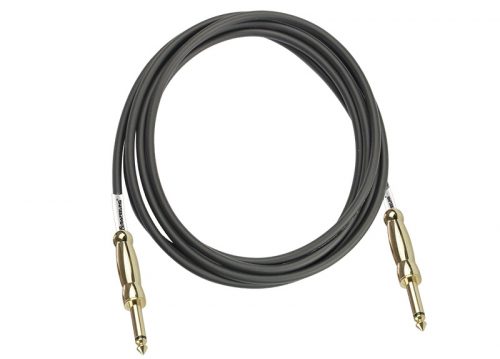
Gold plated guitar cable doesn’t have any impact.
How much should I spend on a guitar cable?
Most guitar cables cost around $20 to $70. Some cables are more than $100, but they are just going to sound similar to these mid-range cables.
As we have discussed, the more expensive cables are not going to sound better, so, we should prefer the mid-range cables which should have all the necessary components.
As a matter of fact, $20 cables are also just fine to use and they are durable enough to last years. All in all, you should always spend less than $100 on a guitar cable.
What size is best for a guitar cable?
The best size for a guitar cable must be less than 18 ft. Longer cables tend to lose signals which is not desirable for guitarists.
Guitar cables’ length is a big question for many newcomers and to be honest, not many guitarists need long cables. The best size should be around 15 ft because it doesn’t lose many signals and can last longer.
Another thing with long cables is that they are also expensive as compared to short cables.
What to see when getting a good guitar cable?
When buying a good guitar cable, pay attention to the noise, quality of the outer jacket, low capacitance, and connector’s quality before buying any guitar cable.
The noise or buzzing sound should be minimum when you buy a cable. The noise from the guitar can ruin your overall experience which is a big thing. The quality of the outer jacket is also important as it protects the inner components of the cable.
There are many cables out there in the market which come with a protective case around the cable.
The other important thing is the low capacitance of the cable. Low capacitance cables enable you to listen to higher frequencies better than others. The capacitance value should be as low as possible.
Conclusion
Guitar cables surely have an effect on tone and sound quality. The material used for guitar cables affects the sound quality because better shielding, better conductor quality, and short length are good for guitar cables.
This surely doesn’t mean that costlier cables are better, in fact, there are many mid-range cables worth around $20 to $70, which are way better than many expensive ones and last many years.
However, there is a difference between a cable being durable and sounding good. There are many thick cables in the market which are going to last many years because of their thick outer jacket, but it’s not compulsory that they are going to sound the best. Similarly, costlier cables are not very much important for many guitarists and cheap cables are going to sound just as good as the expensive ones.
Furthermore, if you’re looking for a perfect guitar cable, then look for a shorter than 18 ft cable by checking its inner material. It must have good electrostatic shielding and conductor used in its inner core.
With that being said, look for good quality and not for shiny objects like gold-plating connectors, thick outer jackets, or long cables for better sounding cables.


